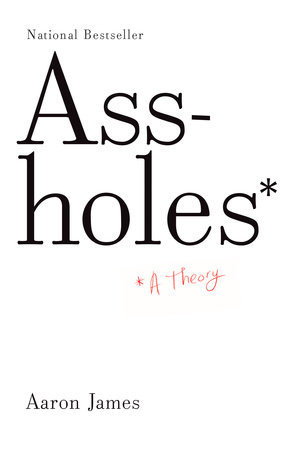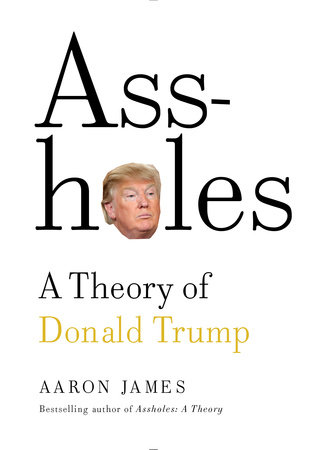An interview
An interview with Almost Always Books, here.
Almost Always Books: Why did you want to publish a monograph on an obscenity, and how did you choose “asshole” as your focus?
Aaron James: I wasn’t interested in obscenities per se. It just occurred to me, one day while surfing, that “asshole” was the kind of concept that could be defined. So I got wondering what the definition would be and with considerable tinkering came up with one that fit the main exemplars I could think of. The book later seemed to be a good way of doing real philosophy that would appeal to a broad audience.
On the other hand, I am *now* very interested in obscenities, or what I call “foul language,” which I am (at the moment) dividing up into three main categories: (i) vice terms (like “jerk” or “asshole”), (ii) pejorative terms (for instance, racist terms such as “wop” or “yankee,” which claim to refer to a group of people), and (iii) slurs (“four eyes” or “dickhead,” which I see as metaphors that lack a conventionalized meaning). I’m now knee deep in meta-ethics and the philosophy of language, but quite unwittingly; I started out just thinking about “asshole” and saw a lot of connections with bigger issues about the nature of ethics and language. Such is life as a philosopher, I suppose. You just follow your nose.
AAB: I know the book is still new, but I was wondering what the academic response to your book has been so far (in print or otherwise). Particularly from other philosophers.
Aaron James: I’ve run the proposal by a lot of professional philosophers and almost all of them like it. Some quibble with details, but all happily and laughingly agree I’ve done for “asshole” whatFrankfurt did for “bullshit.” Which is a nice compliment, because that is pretty much what I was trying to do, whether or not I’ve got everything exactly right. I thought, you know,Frankfurt nailed down bullshit, and I’m a philosopher, so I guess its my job to nail down assholes. That is what got me working on a definition in the first instance during a summer in which I was also surfing a lot.
AAB: The concept of the “asshole” that you are arguing for in the book is summed up in your words as a person “who systematically allows himself to enjoy special advantages in interpersonal relations out of an entrenched sense of entitlement that immunizes him against the complaints of other people.” This is a type that we can all recognize in our lives I’m sure, and you identify many subtypes of the “asshole” as well. But is the “asshole” a modern type, or has it existed through out history under different names?
Aaron James: I’m not completely sure. It does seem that fellow aristocrats in a feudal system, say, could be assholes to each other, even if they certainly weren’t expected to see anyone else as an equal.(Different moral expectations were thought to apply to people further down in the hierarchy, however.) We can say that such people were sorely mistaken, because all persons are in fact equals from a moral perspective. Yet it doesn’t quite seem right to say that aristocrats in such a system all count as assholes simply because they treated people lower on the social rung as less than. The larger ideology does seem to provide some general kind of excuse, or extenuating circumstances, or something.
Even so, there’s no such excuse in a democratic society that does by its nature presume that all citizens are equals before the law, in the political system, and perhaps in the larger system of socio-economic cooperation. In that case, we could explain why the concept of the asshole has the currency it now does as partly a reflection of the fact that we live in an era in which a kind of democratic egalitarianism is widely assumed.
Anyway, these are the kinds of things I think about when I waffle around on the world historical question.
AAB: I like how you identify the “asshole” proper as occupying a unique moral terrain. Their offenses usually do not warrant drastic or punitive action, but they can be troublesome enough to ruin one’s whole day. Does this knowledge now allow us to handle the “asshole” differently on a day-to-day basis?
Aaron James: Yes, that knowledge is supposed to help. It does help me anyway. Once we’ve identified why our day is ruined–because we have not been recognized as the equal we are–we’re at least in a better position to address our need to be recognized. We can find recognition in other ways, in the comfort of understanding friends, or in a form of protest that publicly affirms our worth. That means, in turn, that you don’t have to expect as much from the asshole by way of listening, that you can *expect* him to be disturbing in these ways. His assholery isn’t then as much of a surprise or an occasion for violent reactions; it is easier to go with the flow. It is *only* easier, and still taxing, of course. Even on the rare occasion when I’ve managed an encounter with an asshole perfectly, I’ve still found the rest of the day soured. The upside is that you can say to yourself: “this is just that lingering sourness; it too shall pass.”
AAB: As you get down to the nitty-gritty of your argument, you find it helpful to distinguish for the reader between the “asshole” and the “psychopath.” While the psychopath only “feigns moral action,” the “asshole” is driven by a genuine moral framework, just a distorted and solipsistic one. I was hoping you might argue against the utilitarian stance that it shouldn’t really matter what is in their heart of hearts if they are behaving like psychopaths.
Aaron James: Thanks for the hard-core philosophical question! Utilitarians only care about welfare outcomes, regardless of how those outcomes come about, and so regardless of how people are motivated in action (except insofar as motivation causes greater or lesser happiness). But that means utilitarians can’t distinguish between the psychopath, who lacks moral concepts and so isn’t motivated by them, and the asshole, who does have moral concepts and is motivated by them. Both have to be treated as raising the same regulatory problem, a problem simply of how to get people to conform to rules that promote welfare, according to whatever incentives or sanctions get them to comply.
But this seems wrong! We feel very differently about the psychopath and the asshole, from a moral perspective. The psychopath is arguably just a problem of social control, like a rabid dog, or a wild animal. The asshole, on the other hand, is properly *resented* for his failure to recognize others as equals. Or at least we don’t have to be ambivalent about resenting an asshole in the way we easily can be ambivalent about the psychopath who was severely abused or neglected as a child. There’s still a big philosophical question about how exactly to characterize that difference and whether or to what extent it turns on an underlying difference in motivational capacity. But as long as that *is* the big philosophical question, we are assuming that utilitarianism is false: we aren’t just concerned with the production of happiness. To say that happiness is all that matters, as the utilitarian does, just seems to be inadequate as moral accounting.
AAB: Are “assholes” inherently reformable?
Aaron James: Yes and no. Yes, in the sense that chances of reform are better for the asshole than for the proper psychopath, who may have no road back to moral concern. The asshole at least has moral concerns. On the other hand, once the asshole is entrenched in a perverse use of those concepts, with reinforcing and self-sustaining habits of mind, chances of reform might still be pretty slim. Is there always at least a fighting chance? Maybe, but it seems wrong to me to answer that reform is always in fact psychologically possible. It seems better to say that there’s *always room to hope* for reform, however long the odds seem, just because we never really know what the odds of reform are. We just don’t have that kind of ability to predict the future state of people.
AAB: At different points during my reading of your book I was struck by the thought that the profile of the “asshole” you sketch might fit very well into the upcoming DSM-V as a diagnosable personality disorder. Would such a move by in the spirit of your own analysis?
Aaron James: Yes, although I’m told that the new DSM will absorb the closest category, “narcissistic personality disorder,” into some more general diagnostic kind. That is at cross-purposes with my project of identifying and distinguishing things as things of different kinds. I’m not sure this is a problem with the DSM, though (though it may well be). Philosophy isn’t just therapy, and each can have pretty different taxonomic needs.
AAB: Do you curse in everyday conversation?
Aaron James: Of course! But usually not when better words will do. (Often there aren’t better words.)
AAB: When’s the “douchebag” book coming out?
Aaron James: Oddly enough, I’m not clear enough about the douchebag to know how the book would go. I leave the job to those with good ideas.

